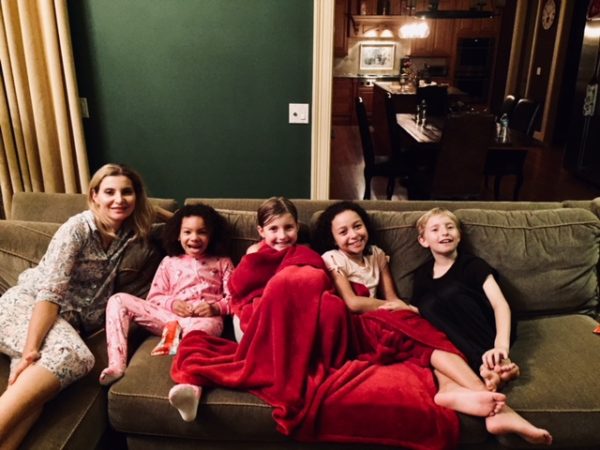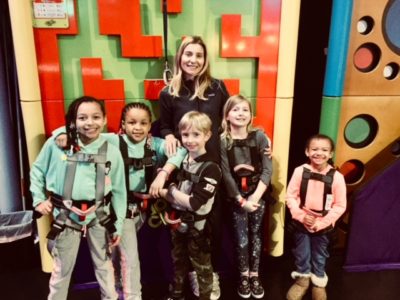
An oftentimes overlooked portion of the population exists mere miles away from the borders of Armonk. The Bedford Hills Correctional Facility is a maximum security prison that houses approximately 1,000 adult females. Armonk resident Joscelyn Read is working alongside organizations such as Hour Children to enhance the quality of life for the mothers within these walls and the children they’ve left beyond the bars.
Building Bridges Through Bars
Hour Children works to nurture relationships between incarcerated mothers and their children with the belief that a strong family connection maximizes a child’s stability and a woman’s chances of success upon reentry. The organization’s mission immediately resonated with Read, who acknowledges that it doesn’t always elicit that reaction, saying, “It’s a population that people don’t want to think about. They assume the prisoners did something bad and should be there. But, in truth, having met these women, many are lovely. They are human beings who often feel terrible about their actions. With a twist of fate, anyone could be in their position. I believe in second chances.”
Describing herself as someone who “likes to get in the thick of things,” Read makes good on those words by regularly opening the doors of her home to the children of women within the confines of Bedford Correctional. “I can’t imagine anything more difficult than having a parent in prison. For the past year and a half, I host two sisters four times a year for three to four nights while they visit their mom in prison from 9 a.m. to 3 p.m.,” she explains. “It’s the only way for them to keep the connection with their mother alive. Beyond that, I get the opportunity to be a positive influence in their lives and it gives their guardian, in this case the maternal grandmother, a break during which they know the children are in a safe place.”
The Innocence of Children
Of her role, Read says, “The biggest question I get is whether I feel nervous about having these kids in my house. People would be surprised that despite the stark socioeconomic differences, these girls are just like every other kid. They love playing with Legos, watching Nickelodeon and going to the movies. They’re innocents. What sets them apart is their strength. To travel by van six hours or more to see your mom while staying at a stranger’s home is the definition of bravery.”
The sisters aren’t the only children benefitting from the experience. “My children, ages seven and eight, see the girls as friends and love when they visit,” Read says. “They’ve also learned that there are children who don’t have the material possessions and support system that they have. This past summer, we even picked the girls up for their visit early so that they could join us at Hershey Park. We are teaching that kindness is not the exception –it’s the expectation.”
“The biggest question I get is whether I feel nervous about having these kids in my house. People would be surprised that despite the stark socioeconomic differences, these girls are just like every other kid. They love playing with Legos, watching Nickelodeon and going to the movies. They’re innocents. What sets them apart is their strength. To travel by van six hours or more to see your mom while staying at a stranger’s home is the definition of bravery.” – Joscelyn Read
Though the Read family strives to fill these visits with fun and laughter, the true purpose is never far from the peripheral. “There’s excitement to see their mother, but also a sadness as reality hits that they haven’t seen her in three to four months. They cry thinking about continuing this pattern for another four years as she serves her sentence. The last day is always the most emotional. They want to keep seeing their mom and they like staying at my house where they not only have their own beds, but their own rooms as well–luxuries they don’t have at home,” Read states.
Paying It Forward
 The statistics for the children of Hour Children are grim. Read reports that children whose mothers are in prison have a much lower college rate versus those whose fathers are in prison. She hopes to crack a dent in that rate, saying, “These girls have to go to college. I love to mentor because I know firsthand how strong an impact it can have on a child’s future. Growing up, I was a little sister in the Big Brothers, Big Sisters program. My mom wasn’t stable and my “big sister” was so important. We would do little activities like make dinner or go bowling. Just having someone show interest in my life was huge and formative. I will absolutely stay in touch with these girls beyond their time in the program. I will be there to make sure they keep their lives on track. I’m paying it forward.”
The statistics for the children of Hour Children are grim. Read reports that children whose mothers are in prison have a much lower college rate versus those whose fathers are in prison. She hopes to crack a dent in that rate, saying, “These girls have to go to college. I love to mentor because I know firsthand how strong an impact it can have on a child’s future. Growing up, I was a little sister in the Big Brothers, Big Sisters program. My mom wasn’t stable and my “big sister” was so important. We would do little activities like make dinner or go bowling. Just having someone show interest in my life was huge and formative. I will absolutely stay in touch with these girls beyond their time in the program. I will be there to make sure they keep their lives on track. I’m paying it forward.”
To find out more about the organization, visit www.hourchildren.org.

